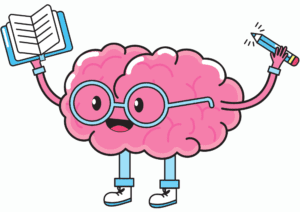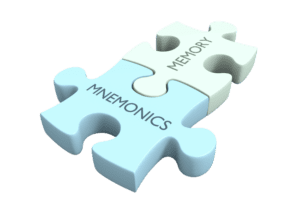Memory plays a vital role in our daily lives, enabling us to encode, store, and retrieve information from our past experiences and knowledge. It provides us with a sense of continuity and coherence, preventing us from becoming overwhelmed by confusion and disorientation. However, many of us struggle with retaining and recalling information, leading to forgetfulness and misplaced items. Despite this challenge, there’s no instant fix or magical solution for memory improvement. Still, there are proven techniques that can sharpen our memory skills, offering hope for improvement.
In this blog post, we will explore effective strategies to enhance our memory capabilities. We will delve into the power of visualization, the art of association, the mindfulness connection, cognitive training, and the role of emotions in memory formation and retrieval.
Additionally, we will discuss some additional ways to improve memory. So, whether you’re a student preparing for exams, a professional striving for better cognitive abilities, or simply looking to sharpen your memory skills, this article is here to help. By adopting these strategies, you can unlock the full potential of your memory and optimize your cognitive function.
Understanding the Basics: How Memory Works
Memory is a complex process that involves encoding, storing, and retrieving information. It starts with encoding, where information is transformed into neural codes. Then comes storage, retaining information over time. Finally, retrieval allows us to access stored information.
Types of memory include sensory memory, holding sensory information briefly, short-term memory for immediate tasks, and long-term memory for lasting storage. Long-term memory has explicit (conscious) and implicit (unconscious) components.
Understanding memory basics helps optimize learning and memory abilities.
Factors Affecting Memory Performance
Several factors can negatively influence memory performance:
- Lack of attention: Not paying adequate attention to information can hinder the encoding process and lead to poor memory formation.
- Stress: High levels of stress can impair memory function. Stress hormones can interfere with memory retrieval and consolidation.
- Sleep deprivation: Insufficient sleep or poor sleep quality can adversely affect memory. During sleep, memories are consolidated and transferred to long-term storage, so lack of sleep can disrupt this process.
- Aging: As people age, they may experience age-related memory decline. The ability to form and retrieve memories may be affected, particularly for episodic memories.
- Mental health conditions: Certain mental health conditions, such as depression, anxiety, and dementia, can have a negative impact on memory. These conditions can affect attention, concentration, and overall cognitive function.
- Medications and substances: Some medications, such as sedatives and antihistamines, can impair memory. Additionally, substance abuse, including alcohol and drug misuse, can have detrimental effects on memory function.
- Distractions and multitasking: Engaging in activities that divide attention, such as multitasking or being constantly distracted, can hinder memory encoding and retrieval.
Effective Psychological Techniques to Improve Memory
Cognitive Training: Sharpen Your Mental Edge
Our cognitive abilities play a crucial role in our everyday lives, from remembering important information to staying focused on tasks. Fortunately, various techniques and strategies can help improve cognitive functions such as memory, attention, and concentration. Let’s explore some effective techniques for cognitive training:
- Working Memory Exercises: One key aspect of cognitive function is working memory, which involves temporarily holding and manipulating information in our minds. To enhance your working memory capacity, try practicing digit span exercises. Start by memorizing a series of numbers, such as 3-7-2-9, and then repeat them in reverse order. Gradually increase the number of digits to challenge and expand your working memory capacity. For instance, you can try memorizing longer sequences like 8-4-6-2-9-1-5-7.
- Attention and Concentration Training: In today’s fast-paced world filled with distractions, improving our ability to focus and sustain attention is essential. Set a timer for 10 minutes and engage in a task without any distractions. It could be reading a book, solving a puzzle, or working on a creative project. Over time, increase the duration of your focused attention sessions. For instance, extend it to 15 or 20 minutes, gradually training your attention and concentration skills.
- Memory Games and Brain Teasers: Memory games and brain teasers are not only enjoyable but also provide valuable cognitive stimulation. Dedicate a few minutes each day to memory games and brain teasers. Play Sudoku, solve crossword puzzles, or try memory-matching games. For example, challenge yourself to complete a Sudoku puzzle every morning or solve a crossword during your lunch break. These games provide mental stimulation, boost memory recall, and encourage strategic thinking.
Emotions and Memory: Unleash the Power of Feeling
Our emotions can greatly influence memory formation and retrieval. By leveraging emotions, we can enhance our memory abilities. Here are two strategies to consider:
- Emotional Association: When studying for an exam or learning new information, try to establish an emotional connection with the material. For instance, if you’re learning about World War II, imagine the emotions people might have felt during that time. Visualize the impact of the events on individuals and societies. By associating emotions with the information, you create a deeper and more memorable connection.
- Personal Relevance: Finding personal relevance in the information you’re learning can also enhance memory retention. When learning new concepts, find ways to relate them to your own experiences, values, or goals. For example, if you’re studying a new language, try to connect vocabulary words with situations from your daily life. If you’re learning the word “table,” imagine yourself sitting at a table with friends, engaging in a lively conversation. By making the information personally relevant, you create an emotional attachment that enhances memory retention.
Association Techniques: Linking the Old and the New
Creating meaningful connections between new information and familiar concepts is a powerful memory enhancement technique. Here are two effective strategies:
- Meaningful Connections: When learning new vocabulary words or concepts, try to associate them with real-life experiences or create vivid mental images related to their meanings. For instance, if you’re learning the word “exhilarating,” imagine yourself skydiving and feeling the rush of excitement. By forging these connections, you provide your brain with hooks for easy retrieval.
- Familiar Concepts: Look for similarities or connections with concepts you already know when encountering new information. If you’re learning about a new scientific concept, relate it to something you already understand or have encountered before. For example, if you’re learning about gravity, think about how it relates to the sensation of objects falling or the way planets orbit the sun. By establishing these links, you create a network of associations that aid in memory retrieval.
The Power of Visualization: Picture-Perfect Memory
Visualization is a powerful technique that harnesses the brain’s ability to create and recall vivid mental images. By utilizing visualization, you can enhance your memory and improve information retention. Let’s explore two effective visualization techniques:
- Vivid Mental Images: When trying to remember information, visualize each item in a striking and memorable way. For instance, imagine a juicy, ripe orange bursting with flavor or envision a carton of eggs falling and cracking on the floor. By associating the information with vivid mental images, you provide your brain with visual cues that can trigger memory recall later.
- Memory Palaces: The Memory Palace technique, also known as the Method of Loci, is a visualization technique used since ancient times to improve memory. Mentally construct an imaginary palace or familiar location and associate specific pieces of information with different rooms or locations within the palace. For example, if you’re memorizing a speech, visualize each paragraph being delivered in a distinct room of the palace. As you mentally navigate through the palace, you can easily recall the associated information. This technique capitalizes on our spatial memory and the brain’s ability to remember locations, making it an effective tool for memory enhancement.
Mindfulness: Focus and Declutter for Optimal Memory
Practicing mindfulness can optimize your memory performance by sharpening focus and reducing mental clutter. Consider these mindfulness practices:
- Be Present and Attentive: Whether you’re studying, attending a lecture, or engaging in a conversation, practice being fully present and attentive. Avoid distractions, put away your phone, and give your undivided attention to the information at hand. By being fully engaged in the present moment, you create an ideal environment for effective encoding and retrieval of information.
- Clear Mental Clutter: Incorporate mindfulness techniques such as meditation or deep breathing exercises into your daily routine. Take a few moments each day to quiet your mind, reduce stress, and create mental space for better memory function. By clearing away mental clutter, you can allocate your cognitive resources more effectively, enhancing your memory capabilities.
Some Additional Strategies
Here are a few extra strategies that can be utilized in addition to psychological methods for improving memory.
- Regular Physical Exercise: Engaging in regular physical exercise has been shown to have numerous cognitive benefits, including improved memory and attention. Exercise increases blood flow to the brain, promotes the growth of new neurons, and enhances synaptic connections, all of which can support memory function.
- Healthy Diet: A nutritious diet can positively impact brain health and memory. Include foods rich in antioxidants, omega-3 fatty acids, and vitamins B6, B12, and folate. These nutrients support brain function and may help improve memory. Examples include fruits, vegetables, whole grains, fish, nuts, and seeds.
- Sufficient Sleep: A good night’s sleep is essential for memory consolidation. During sleep, the brain processes and stores newly acquired information. Aim for 7-8 hours of quality sleep each night to optimize memory retention and recall.
- Stress Management: Chronic stress can negatively affect memory and cognitive function. Practice stress management techniques such as deep breathing exercises, meditation, yoga, or engaging in hobbies or activities that promote relaxation. Managing stress can help protect and enhance memory.
- Social Engagement: Maintaining social connections and engaging in social activities can have a positive impact on memory. Regular social interaction stimulates the brain, reduces the risk of cognitive decline, and provides opportunities for mental stimulation and memory recall.
- Intellectual Stimulation: Keep your mind active by regularly challenging it with intellectually stimulating activities. Read books, solve puzzles, learn a new skill or language, engage in discussions or debates, or participate in activities that require critical thinking. These activities can help maintain and improve memory function.
- Organization and Planning: Developing effective organizational and planning skills can support memory improvement. Use calendars, planners, or digital tools to manage your schedule, set reminders, and keep track of important tasks or events. Breaking down complex information into manageable chunks and creating a structured routine can also aid memory retention.
- Avoiding Substance Abuse: Substance abuse, including excessive alcohol consumption and drug use, can impair memory and cognitive function. Minimize or avoid these substances to maintain optimal brain health and memory performance.
Conclusion:
Improving memory is a complex process that requires a deep understanding of memory function and the implementation of effective strategies. Despite the presence of factors that can negatively influence memory performance, including aging, certain medical conditions, and genetic predispositions, it is important to recognize that memory can still be improved through various techniques and lifestyle changes. By adopting these strategies and incorporating them into your daily life, you can unlock the full potential of your memory and enjoy enhanced cognitive performance.
Remember that everyone’s memory is unique, and not all strategies may work equally well for everyone. It’s important to find the approaches that resonate with you and incorporate them into your lifestyle consistently for long-term memory improvement.

